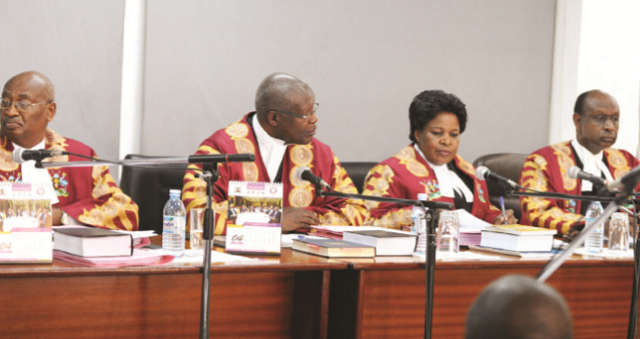
In 2015 the appointment of the Chief Justice and confirming his deputy came after a long vacuum of up to two years.
This was interpreted by many to have come as a result of President Museveni’s agonizing over a suitable replacement for Chief Justice Benjamin Odoki. Museveni had attempted to go around the age-limit of judges and have Odoki as chief justice even though he had clocked the 70-year barrier in 2013.
But Museveni’s attempt to re-appoint Odoki was challenged in court by lawyers Kanyeihamba and Gerald Karuhanga and his vetting in parliament failed after Speaker Rebecca Kadaga threw his name out because of a pending Constitutional Court decision on the petition.
After failing to retain Odoki, Museveni had no choice but to leave equally loyal Justice Kavuma in acting position as chief justice for two years even if, according to several calculations, Kavuma was not a suitable choice for CJ.
Museveni only appointed Justice Katureebe following mounted pressure from leaders of legal bodies and threats of strikes. But even when Museveni appointed Katureebe, he retained Kavuma as deputy chief justice.
These events might explain the anxiety around what happens when Justice Katureebe’s time elapses in 2020 when he clocks 70 years. Article 144 of the Constitution requires a judge of the Supreme Court and Court of Appeal, which also sits as the Constitutional Court, to retire at 70 years while a judge of the High Court retires upon turning 65 years. Judges of the High Court due to retire in 2017 are Ezekiel Muhanguzi, Elizabeth Nahamya, and Akiiki Kiiza.
The renewed discussion around the retiring judges has swung back to arguments that were made earlier. In an earlier interview with The Independent, Sekitoleko said judges in Uganda retire at the time when they are ‘needed most.’ He was advocating for the age-limit to be pushed to 70 years for High Court judges, and 75 years for those of the Constitutional Court. He said at 65 years and 70 years, the judges are just perfecting their trade and are making fewer errors. He recommended for Uganda to take lessons from other countries where judges work for all their life and never retire.
Kanyeihamba told The Independent that judges staying on beyond 70 years or even 75 years would not be a problem if they were as independent as they ought to be.The problem according to him stems from the not so easy provisions in the laws that exclusively give the President, the Judicial Service Commission and Parliament powers of appointment and vetting without accepting recommendations from other stakeholders.
“Judicial powers have been surrendered to President Museveni who now nominates, appoints judges, and only directs the Judicial Service Commission to approve his acts. It’s no longer individual merit but how loyal one is. That’s why you see judicial officers increasingly succumbing to the Executive’s demands,” Kanyeihamba says.
To him, the push for credible justices should start now.
“We need a new breed of judges who are independent. If this campaign is not started early enough we are bound to either get an NRM judiciary or another vacuum.”
****
editor@independent.co.ug
 The Independent Uganda: You get the Truth we Pay the Price
The Independent Uganda: You get the Truth we Pay the Price



